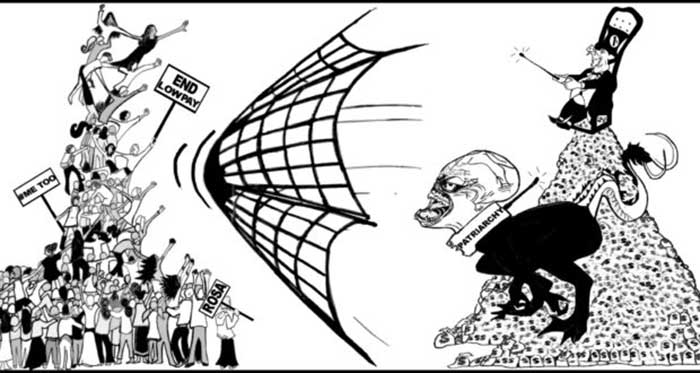Omar Raad Chowdhury
Women around the world, regardless of their status, nationality, color, are at a constant state of war with the patriarchy, a war that has been raging since the Agricultural Revolution and that has its roots deeply embedded in property relations. Rapes are the by-products of that war, patriarchy’s trophies won in shameless battles. And, as long as we would not acknowledge the fact that patriarchy today is facilitated and nurtured by capitalism, we would only misinterpret the power structure that perpetuates rape and continue to be misled in this war.
But the cost of this war is too high. Given the social stigma around rape (and overall everything that is sexual), there is legit scope for casting doubt over rape statistics of Bangladesh. However, even the understated documentation of rape in Bangladesh reflects the horrifying extent of insecurity that curtails our women. The picture stands manifold worse if the average Bengali women’s daily experience of sexual misconduct and harassment, which are often revealed only at close circles, are factored in.
As the country stood shocked at the news of the rape of a student of University of Dhaka at Kurmitola, Dhaka on the 5th of this month, students erupted in protests; old questions and solutions are now being revisited, old slogans are being reiterated. Just a day later, a garment worker was raped at Kafrul, Dhaka. The rapist of the student of Dhaka University has been apprehended and it is widely being expected that a fast trial would follow, just as it had been in the case of Nusrat, a Madrassa student who was first raped by the principal of her Madrassa and later murdered—burned to death, by the principal’s associates.
There is noticeable difference in the response of the state towards these events. Does the state now only respond to pressure mounted by the urban middle-class? Notably, the middle-class today has more capacity for mobilization and organization than other classes of the society. It is, perhaps, this difference in capacity that determines the difference in popular response.
Nevertheless, it is imperative that activists, especially the feminists in Bangladesh, re-examine the theoretical orientation of the general movement against patriarchy.
Among activists and advocates, there exists a consensus that to counter rape, it is quintessential to ensure rule of law, among other things. It is true that commodification of women, unequal property rights, gender wage gap, hegemonic masculinity and similar issues have also been in discussion, but the current discourse centers around reformation of law and proper implementation of the reformed laws.The argument is built on the rationale of deterrence with varying degree of disagreement regarding the severity of punishment.
In both formal and informal discussions, reference to the Nordic countries is frequently made, with apparent belief that women in the West, particularly in Nordic countries, live in a safer environment.While there is some degree of truth in that, it must also be cautiously noted that “safer” does not mean “zero rape” or “zero sexual assault”. Statistics might help to put things into perspective.
The Rule of Law Index by the World Justice Project ranks Denmark the number one (http://data.worldjusticeproject.org/#table). The country also ranks high in other indices of gender equality and rights. Yet, last year, Amnesty International stated that Denmark has “Widespread Sexual Violence”. A BBC report from March 11, 2019 states: The Danish Ministry of Justice estimates that around 5,100 women a year are victims of rape or attempted rape, while the University of Southern Denmark put this figure as high as 24,000 in 2017—a high number for a country with a relatively small population (5.8 million) (https://www.bbc.com/news/world-europe-47470353).
New World Wealth, a South Africa based global market research group, ranked Australia the safest country in the world for women in its 2019 Global Wealth Migration Review. Just as Denmark, Australia also does well in indicators related to gender equality. According to Personal Safety Survey 2016 conducted by the Australian Bureau of Statistics (ABS), almost one in five women in Australia had experienced sexual violence (18% or 1.7 million), with sexual assault experienced by 17% (1.6 million) and sexual threat experienced by 4% (339,900).
The US has been deliberately left out from this discussion as the country’s position in the indices mentioned above is quiet depressing when compared to Denmark or Australia. The kingpin of global capitalism has very disturbing rape statistics. According to the 2018 Uniform Crime Report (UCR), 127,258 rapes were reported to US law enforcement in 2018. It has been estimated by the 2016 National Crime Victimization Survey (NCVS) that there were 431,840 incidents of rape or sexual assault in 2015, which may not have been reported to the police. In addition to these numbers, let us also remember the nightmarish reality exposed by the MeToo movement.
These statistics should not lead us to believe that there is hardly any difference between the situation in South Asia region or Middle East and Nordic Countries; or broadly between the global North (where “rule” of law exists in a broader capacity) and global South (where “rule” of law exists in a narrower capacity). These statistics indicate two things: 1) Patriarchy is still dominant in countries doing well in gender related indices; and 2) while rule of law ensures justice, it does not necessarily act as the ultimate deterrence against sexual violence towards women, as it is often believed to be.
Then again, it would be absolutely wrong to argue that rule of law does not have anything to do with the safety of women. Between lawlessness and rule of law, the later definitely offers a better condition for women. But the fact remains that, establishment of rule of law, affirmative actions for women, enforcement of equal opportunities for women, design of curriculum in favor of ideas of gender equality—none of these has been sufficient to completely abolish patriarchy and establish gender equality.
Many liberals would find this line of argument intriguing, considering that they have placed their faith on the sacred combination of free market mechanism and limited state intervention as embodied in the Welfare State model, with the belief that the Welfare State will abolish patriarchy.
Unfortunately, facts do not support their faith. Although some of them might jump to their feet claiming patriarchy does not have anything to do with capitalism and continue to live in an imbecilic dream that it is somehow possible to abolish patriarchy without confronting capitalism.
Based on Morgan’s work, the relation between private property and patriarchy has been explored by Engels, quite brilliantly. His explanation follows that, as the preservation of inheritance became a quintessential condition for the development of private property and class-based society, post-Agricultural Revolution human society turned away from matriarchy and fell into patriarchy. Since the dissolution of primitive communism, from slave society, through feudalism and now into capitalism, private property has changed its form but kept its hold on the political–economic fabric of human society, and, therefore, it is important to remember that as long as private property exists, the socio–political–economic structure that has formed around it would continue to sustain patriarchy. This symbiotic mechanism is fueled again by capitalism’s two trademark features: commodification and commodity fetishism. The woman is not only commodified but also fetishised as a commodity by consumer; the result being complete disregard of the woman’s individuality and ensuing direct–indirect power practice by the male, all of which manifests itself through systematic discrimination and sexual violence against women.
It is also important to understand that rule of law is the result of the union between the state and capital. The more mature the capital is, the more efficient the state must be, as the state is required to safeguard capital’s interest. In most countries / regions of the global South, where capitalism is still in an immature stage, the state, correspondingly, is inherently incapable of enforcing the rule of law. The primary reason is immature capital in those countries profits in a cheaper way from the lawlessness that reigns. This can perhaps be compared with the primitive accumulation of capital that formed the basis of modern capitalism.
The underlying causality in this scenario must be incorporated in the strategy of the movement against patriarchy. Those fighting against patriarchy must realise that: a) addressing patriarchy as a system separate from capitalism would only lead to misjudgment in determining the path of the movement; and b) the fight against patriarchy in the global South (as in Bangladesh) can not be characteristically identical with the movement in the global North, as the patriarchal structure in the global South, although same in the core, has different tendencies and attributes than that in the global North, given that the stage of the capital in the two regions are very different.
(Omar Raad Chowdhury is an MSS student of Economics at University of Dhaka, Bangladesh.)




